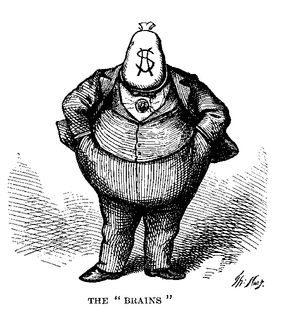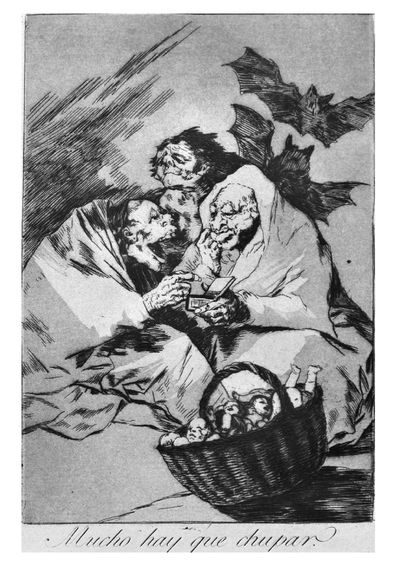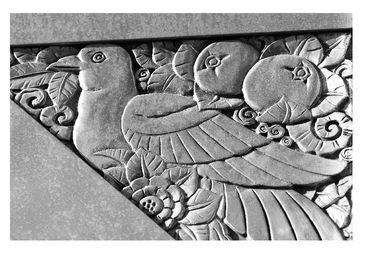The Rags of Time (26 page)
Authors: Maureen Howard

I’m well aware my soapbox is cheap wood that splinters. I expect my brother’s reprimand:
Mims, don’t ask easy questions not appropriate for
The Historie of the World.
Who remembers that endless rubbers of bridge and bootleg booze reigned in the White House, Harding administration? ’68, student riots, April or May?
Mims, don’t ask easy questions not appropriate for
The Historie of the World.
Who remembers that endless rubbers of bridge and bootleg booze reigned in the White House, Harding administration? ’68, student riots, April or May?
I retaliate with silence, with visuals: The Nast cartoons of Boss Tweed that brought him down. Chaplin playing Hitler, blows the world into a balloon, flips it to destruction with the tip of his toe. In
The Disasters of War,
Goya gives each horror a one-liner—“For this you were born,” “There’s lots to suck.”
The Disasters of War,
Goya gives each horror a one-liner—“For this you were born,” “There’s lots to suck.”


Guernica gathers silence.
You call, checking to see I’m in lockup, as ordered:
The turkey?
The turkey?
Kosher organic!
We talk mashed potatoes, no turnips.
We talk mashed potatoes, no turnips.
Not breaking the rules of my confinement, I descend once again to the lobby.
I dreamt that I dwelt in marble halls, with vassals and serfs at my side:
terrazzo will have to do, movie-set palatial—mirrored, German nickel frieze of arcs, futuristic leaves and sleek posies. The good men who keep track of us are members of Local 32BJ, Service Employees International Union, not Beefeaters in medieval finery guarding a tourist tower. Dogs sport raincoats today. Newborn, size of a rump roast, swaddled under plastic. Psychiatrists, folders held close to their chests, go the midday route back to their consulting rooms. Hello darkness, fantasy, revenge surfacing in notes of their listening profession. Kurt Eisler—do you remember how dutifully he walked his little white dog? Keeper of the Freud papers, Dr. Eisler was not given to idle greetings. To the end he practiced analysis as set forth by the master, so we were told by a fellow who inherited a brewery, detailed the wealth of his dreams every day to Dr. Grump, who was patient with the nips of his dog. Long gone, along with the adman who jogged to death on a Christmas morning, and the Irish doormen and deskman—plump, good-humored like the boys I grew up with—and the skeletal woman working out in the gym, last seen as cult figure in an arid landscape as we switched channels, switched back to hear her hooting at the moon. More than goldbricks and gossip—no celebrities, please—as I greet fellow inmates, though never to reveal what might be called the plot with maximum honesty. Or why I must not venture, a personal story.
I dreamt that I dwelt in marble halls, with vassals and serfs at my side:
terrazzo will have to do, movie-set palatial—mirrored, German nickel frieze of arcs, futuristic leaves and sleek posies. The good men who keep track of us are members of Local 32BJ, Service Employees International Union, not Beefeaters in medieval finery guarding a tourist tower. Dogs sport raincoats today. Newborn, size of a rump roast, swaddled under plastic. Psychiatrists, folders held close to their chests, go the midday route back to their consulting rooms. Hello darkness, fantasy, revenge surfacing in notes of their listening profession. Kurt Eisler—do you remember how dutifully he walked his little white dog? Keeper of the Freud papers, Dr. Eisler was not given to idle greetings. To the end he practiced analysis as set forth by the master, so we were told by a fellow who inherited a brewery, detailed the wealth of his dreams every day to Dr. Grump, who was patient with the nips of his dog. Long gone, along with the adman who jogged to death on a Christmas morning, and the Irish doormen and deskman—plump, good-humored like the boys I grew up with—and the skeletal woman working out in the gym, last seen as cult figure in an arid landscape as we switched channels, switched back to hear her hooting at the moon. More than goldbricks and gossip—no celebrities, please—as I greet fellow inmates, though never to reveal what might be called the plot with maximum honesty. Or why I must not venture, a personal story.

It came slowly, the pain. First, a muscle pull, a familiar wrenching as when transplanting the laurel with a spade. Cold days had come on, Autumn giving way to deep frost. We had retreated to the city, drawn back to the rags of time that are to end my four seasons. As though they are mine, like Vivaldi’s, Poussin’s, Balanchine’s Four Temperaments? No indeed, like the plain
Old Farmer’s Almanac
with its solo turns of useful information and oddments of stories.
Old Farmer’s Almanac
with its solo turns of useful information and oddments of stories.
The pain in my left shoulder blade, intense. You were just home from the office, said I must see the doctor. We went together in search of an immediate poultice or pill. I answered the doctor’s questions. Then you were answering the same questions in the emergency room while an intern slid me onto a gurney. The boy—I say boy, having heard you report the date of my birth to one attendant, then another—moved with grace and speed hooking me up. We watched my crazy bleeps on a screen. The intern was working off his assignment in ER. How easily we chatted once the pain subsided. The heart would not be his practice.
Sports medicine, aiming for the healthy ticker.
Which seemed impolitic as we watched the erratic performance of my heart.
Which seemed impolitic as we watched the erratic performance of my heart.
Healthy to begin with?
Healthy at the finish line.
Recalling how I sparred with a particularly smug student.
What did you like about Kafka?
What did you like about Kafka?
Didn’t like him at all.
I lay with others in a state of emergency. Some hoped for a bed, others to be dismissed with a warning and a prescription. The young woman next to me had been beaten by her husband, perhaps a broken jaw, a story she was eager though painful to tell. A babbling old black hat bobbed his head, his mumbled prayer joining with songlike moans of a young woman in a head scarf. All others were silent, waiting to be transported to the next lap of their journey in the belly of the beast, Mount Sinai looming over the Park. The dumb show of TV at a distance. Vials of my blood taken. You tucked the thin blanket over my toes, asked questions that seemed to the point of my pain, recorded the nurse’s evasive answers.
On our way to the hospital in a cab, tears stung my eyes. Tears of pure pain, addressing the hurt at hand, differ from tears of grief. Idle tears are for memory of a grandfather’s keloid half finger; for a trick-or-treat boy who lost his belief in transformation; for a villa not reclaimed in Innsbruck, sold by a wealthy widow in Houston to the highest bidder.
I said:
Lamentations.
We were holding hands. We are given to fleeting caresses, swift kisses, gestures of enduring affection—soppy, were it not countered by our well-honed give-and-take.
When you go home, you’ll find the Bible . . .
Lamentations.
We were holding hands. We are given to fleeting caresses, swift kisses, gestures of enduring affection—soppy, were it not countered by our well-honed give-and-take.
When you go home, you’ll find the Bible . . .
I’m not going home.
Foolish. They’re taking good care of me here. In fact the doctor—not the one in training for the healthy heart—Dr. Shah is on my case. He’d like to know if I admire Salman Rushdie. He most certainly does. I’d rather have remained anon when you filled out the form. Not a vital sign, my backroom profession. You’ll find the King James next to
The Executioner’s Song.
Often it’s just where a big book fitso nas helf.
The Executioner’s Song.
Often it’s just where a big book fitso nas helf.
You’d not go home till Dr. Shah turned you out. He pushed my gurney to a quiet hall.
You see,
he said,
I have little time to read.
You see,
he said,
I have little time to read.
I did see, and that he’s Bollywood gorgeous, his white coat left open, the better to display a preppy polo shirt, jeans that attain to perfection. We agreed that I’ll make a list—stories and novellas only—while he went off to the next patient and the next, Shah’s chosen practice being the infinite variety of emergency.
When I wake, the Park lies out my window. The very Park I must not walk in today is lit along paths unfamiliar to me, Fifth Avenue, East side of the Greensward. I’m alone with my monitor/minotaur tracking me. A nurse comes with orange juice and crackers.
Part of the rescue,
he says, then draws blood; they all do.
If you want the TV, you have to pay.
Part of the rescue,
he says, then draws blood; they all do.
If you want the TV, you have to pay.
I’ll pay not to have it.
He’s just come on duty. My rebuff may be first of the day. He knows how to handle me, lets me stand at the window.
The Gardens,
I suggest.
Aren’t they grand?
I suggest.
Aren’t they grand?
He’s never been to the Park, what with night duty, the commute from Queens. Two-thirty in the morning, the trains run seldom and late.
Well, it’s all grand. Never viewed the Park from this perspective, craggy hills jutting upward. In daylight, a view of the Harlem Meer I’ve only seen mapped, a natural body of water, needed dredging to fit Olmsted and Vaux’s Adirondacks scheme. So this is where you fished with Bimbo, threw your catch back according to the rules, though once you brought a carp home. Your mother wouldn’t touch it. It lay on the kitchen table, the milk scum of death on its eye, hook still in its open mouth as if to gulp air till your father came home and wrapped it gently in the sports pages of the
Telegram.
You had wanted to read the Giants lineup against the Boston Bees. Carl Hubbell pitching.
Telegram.
You had wanted to read the Giants lineup against the Boston Bees. Carl Hubbell pitching.
Summer camp for that boy,
your mother said,
he’s best out of here.
your mother said,
he’s best out of here.
This story a shortcut back to the night I scanned territory unknown from the hospital window, plagiarized your memory while waiting for news of my mortality. When dawn finally came, I saw clear across the Park to the towers, just the golden pinnacles above the leafless trees. Waiting for a test we can’t cram for, you found me in this room with a view, threw your
Times
aside in an extravagant gesture, read me words copied in your unreadable hand, words soon to be filed away with old postcards and Park memorabilia:
Times
aside in an extravagant gesture, read me words copied in your unreadable hand, words soon to be filed away with old postcards and Park memorabilia:
How the gold has grown dim,
How the pure gold is changed!
The sacred stones lie scattered
at the head of every street.
How the pure gold is changed!
The sacred stones lie scattered
at the head of every street.
—Lamentations 4:1
You knew as you
quoted,
that I never intended you should cart the big book across town. You had searched out a passage that would support your order, that for the life of me, I best stay home, tour the devalued El Dorado. Despite good news in the commodities market, bitter cold would come. Today, you repeated that old turn of phrase to confine me.
Don’t venture.
quoted,
that I never intended you should cart the big book across town. You had searched out a passage that would support your order, that for the life of me, I best stay home, tour the devalued El Dorado. Despite good news in the commodities market, bitter cold would come. Today, you repeated that old turn of phrase to confine me.
Don’t venture.
Turning from the love story of Perseus and Andromeda, we walk through a lofty Promenade to view the mural, our prize. There was a season in which I loitered here, rifling through my purse for wallet and glasses, ducking round to the back elevator bank to hear Pinky Zukerman in his practice room run through a rehearsal of Brahms or Schubert, his half of the Vivaldi Double, until one day when he was to play in Carnegie Hall there was silence. Billy or Patrick, one of the hall men, said:
He’s moved out.
Abandoned, I consoled myself with Willy Pogany’s mural, seen/unseen over the years.
He’s moved out.
Abandoned, I consoled myself with Willy Pogany’s mural, seen/unseen over the years.
Most likely the commission was handed to Willy by Emery Roth, the architectural designer of the interior of the building. Both top of their game in ’29. Roth was senior. As an émigré kid, he picked up drafting skills, worked as a young man on the World’s Columbian Exposition of 1892. Frederick Law Olmsted, Landscape Architect of that monumental occasion, would not have known an apprentice, but it’s not beyond supposing that Roth, having come up in the world, had a mural in mind, passed the El Dorado job to his fellow Hungarian, Pogany. Murals were in fashion, the big picture rescued from the frame. Diego Rivera, Orozco came up from Mexico, where they painted history large as altarpieces, recasting religious themes. Clear political messages, that’s what they were up to in the broad strokes of public art. For twenty-nine years I’d passed Pogany’s
El Dorado
with a quick look-see, can’t remember the day it came over me: it’s theater, maybe political and not so simple. In the foreground, beautiful people—who bear no resemblance to Peruvian, Minoan, Trinidadian, or free citizens of Guantánamo Bay—are displayed in the extravagant flora and fauna of a legendary place. A dreamy girl lazing at the bottom of the canvas may be stoned on the tropical flora. Pasties on her breasts? Her double, saddled on a white steed, smiles upon a suitor serenading her with a lute. Vacant girls waiting for their cue while to stage right the indigenous are packing up to depart the scene. One fellow heaves a shipping crate onto his shoulder, same costume trunk as the extras and their vassals—pan-historical jerkins and tunics—same exotic paraphernalia of fronds and a bird never seen by Columbus or Raleigh. Even Audubon, blind and daffy in the swamps of Florida on his final search for every possible American bird, could not invent the extravagant plumage imagined in Willy’s storybook scene.
El Dorado
with a quick look-see, can’t remember the day it came over me: it’s theater, maybe political and not so simple. In the foreground, beautiful people—who bear no resemblance to Peruvian, Minoan, Trinidadian, or free citizens of Guantánamo Bay—are displayed in the extravagant flora and fauna of a legendary place. A dreamy girl lazing at the bottom of the canvas may be stoned on the tropical flora. Pasties on her breasts? Her double, saddled on a white steed, smiles upon a suitor serenading her with a lute. Vacant girls waiting for their cue while to stage right the indigenous are packing up to depart the scene. One fellow heaves a shipping crate onto his shoulder, same costume trunk as the extras and their vassals—pan-historical jerkins and tunics—same exotic paraphernalia of fronds and a bird never seen by Columbus or Raleigh. Even Audubon, blind and daffy in the swamps of Florida on his final search for every possible American bird, could not invent the extravagant plumage imagined in Willy’s storybook scene.
Other books
The Beauty Detox Solution by Kimberly Snyder
En el camino by Jack Kerouac
Daughter of the Drow by Cunningham, Elaine
The Old House on the Corner by Maureen Lee
Intentions - SF9 by Meagher, Susan X
The Blood Dimmed Tide by Anthony Quinn
Play Date (Play Makers Book 3) by Kate Donovan
Hannah Coulter by Wendell Berry
Selby Speaks by Duncan Ball
Start Shooting by Charlie Newton